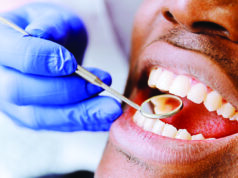By Beatrice Nakibuuka
If you find yourself seeking solutions for your skin issues, whether it be pigmentation, acne, wrinkles, fine lines, or if you simply don’t feel like you are glowing the way you should be, chances are: there is something you are not doing right.
Skin health may not be a serious concern for many people, but those dealing with its problems will do anything to have a fair one.
There are some skin conditions that affect people because of their age, lifestyle, poor diet, among other health conditions.
However, these problems should never define who you are because dermatologists have solutions to them.
For some conditions, you just have to make lifestyle changes to manage them . While for others, medical attention is needed.
Acne
Acne is sometimes seen as a problem that plagues teenagers, but adults too, can get it. It is important to know what triggers it to see how to fight it.
This skin problem starts when oil and dead skin cells clog up pores on the skin.
The bacteria may grow in this mix which causes pain, swelling, redness and pimples. They may cause bulging of the pore as a black or white head.
It affects both men and women. Seasonal acne can go away on its own, but in some people, it is a hormone problem that tends to be chronic.
It usually starts during teen and young adult years of development.
During this time, both males and females produce more testosterone hormone than any other time in their life.
The hormone makes one produce more oil called sebum. The oil clogs the pores causing acne. Different people have different reactions and this can be the reason for acne in some adolescents.
Acne usually appears on the face, chest, shoulders and back because these areas of the skin have several sebaceous glands.
This skin problem reduces with age when the body produces less testosterone.
Some women get a flare-up of the acne towards or during their menstruation periods. While others get them during pregnancy, but clear thereafter.

Uneven skin tone
Many people, both men and women use lightening creams for several reasons. One of them is to balance the skin tone.
While some may use creams as a treatment for skin problems like freckles, acne and chicken pox scars, and anti-aging, others use them on the entire body to bleach and look brighter because in some countries, looking brighter indicates being in a higher status and beautiful.
Recently, Ivory Coast officially banned skin-whitening creams due to health concerns.
The country’s health minister said that “Cosmetic lightening and hygiene creams that de-pigment the skin are now forbidden.”
There are, however, situations when lightening creams are recommended for medical use, according to Dr Malik Ssempereza, a dermatologist at Unity Skin Clinic in Kampala.
According to Dr Ssempereza, when a person has had eczema, chicken pox, or acne patches he usually recommends a cream with specific ingredients, but it must be used for a few weeks and under supervision.
He says skin-lightening procedures can be in different forms which may include creams and lotions, injections and pills.
These products contain chemicals that work by blocking the mechanism by which melanocytes make skin colour.
“Melanocytes are the cells responsible for making melanin; a pigment that gives skin colour.
The more melanin the melanocytes produce, the darker the skin, and the lesser melanin, the brighter the skin colour,” Dr Ssempereza says.
Absence of or lessened melanin makes people using lightening creams at risk of skin cancer because melanin acts as a natural sunblock that protects the skin from the Ultra Violet rays of the sun and provides a Sun Protection Factor (SPF).
Dr Ssempereza adds: “The melanocytes produce melanin depending on the amount of sun present.
“This explains why people who live in areas where there is too much sunshine are usually dark-skinned.”
The amount of melanin a person has depends on the genetic mechanism, but its production can be affected by injuries like burns, exposure to sunlight, hormones and exposure to certain chemicals.

Dangerous ingredients
According to Dr Edward Ogwang, a dermatologist at Kampala Skin Clinic, there are so many lightening creams sold on the market, and buying any non-prescribed lightening cream can be the greatest regret of your life as many of them contain mercury, steroids, hydroquinone and parabens that may be carcinogenic (having the potential to cause cancer).
To make matters worse, these products are sold at a very low price and unregulated in some countries. This makes people more prone to skin cancers and other skin-related diseases.
Before buying and using any lightening products, make sure you read the instructions and ingredients and the amount contained therein.
Dr Ssempereza recommends that the concentration of hydroquinone should not be more than two percent.
Hydroquinone causes ochronosis commonly known as namakula in Luganda, a serious and permanent damage of the deeper layers of the skin that cannot be treated or reversed.
It also causes a burning sensation and if used for a long time, the ingredient can cause cancer. Ochronosis is a disorder characterized by blue-black or grey-blue pigmentation on skin.
The use of mercury as an ingredient in whitening products has been banned in most countries because it is poisonous, cancerous and can cause kidney problems.
Most over-the-counter creams used as medication are supposed to be used for a few weeks because they contain steroids which are known to cause stretch marks, make the skin very sensitive and are prone to infections and allergies.
They wash off the skin and make it thin out that the veins are easily seen.
Achieving even skin
Lightening creams are never recommended in dermatology, according to Dr Henry Ngobi, a skin specialist at Jinja Hospital.
People should learn to appreciate who they are because the creams are not safe at all.
According to Dr Ogwang, it is not common for a person to have a relatively uniform skin colour because sometimes we are exposed to the sun.
“People should never worry about the colour of their skin because the tone of the skin where the body is covered is their real color.

“All they need to do is avoid staying in too much sunshine and within a few months, they will achieve the right texture of their skin,” Dr Ssempereza also says.
One can try to achieve skin evenness by staying indoors and keeping the body covered to protect it from sunburns.
The skin lightening injection containing glutathione supplement is recommended as a safe product although it is commonly used as treatment for people with liver problems to detoxify the liver.
Sunscreen with a sun protection factor of 30 is recommendable. Also, kojic acid and lemon line can help penetrate into the skin to clear some skin problems that may have caused darkening and spotting of the skin.
“One can also use chemical peels to improve their facial skin texture.
“It involves using a chemical solution that causes the old skin to soften and peel off and the new regenerated skin is usually smooth and less wrinkled,” says Dr Ssempereza.
A chemical peel is a procedure in which a chemical solution is applied to the skin to remove the top layers. The skin that grows back is smoother.
However, these are not for everyone. Your doctor should recommend what is best for your skin. Chemical solutions typically used include glycolic acid, trichloroacetic acid, salicylic acid, lactic acid or carbolic acid (phenol).
Risks of Skin lighteners
– Prolonged use can contribute to premature aging of skin.
– Long-term use may increase the risk of skin cancer from sun exposure. Always use sunscreen when using a skin lightener and going out in the sun.
– Steroids in some skin lighteners may increase risk for skin infections, skin thinning, acne, and poor wound healing.

Never sleep in makeup
One night of sleeping in your makeup is unlikely to cause long-lasting damage to your skin.
However, according to Dr Ogwang, each night you sleep with your makeup, your pores become more clogged and your skin becomes more vulnerable to early aging.
“It is tempting to fall asleep with your makeup on but never forget to take it off. If you are so tired and taking off your make-up feels like a big task, the least you could do is keep some facial cleansing wipes next to your bed for a quick swipe before you sleep,” Dr Ogwang says.
He adds that although this may not remove every single makeup particle on your skin, it is certainly better than not removing it at all.
According to Dr Ssempereza, sleeping in your make-up at night has a very serious damage to your skin.
“This is the time your skin must repair itself. When you leave makeup on your skin, it can clog the pores and not allow the skin to breathe.
“This can cause unevenness of your color tone, acne, dryness and faster aging of your skin,” he says.
Dr Ssempereza adds that one must make sure they remove even mascara because it can clog the tiny hair follicles in the eyelids. The clogging can further cause irritation, inflammation, or even eye cysts.
Your skin is likely to become dry because the pores that produce the oils that lubricate the skin are blocked and become nonfunctional.
Dr Ogwand adds: “Leftover eye shadow clogs the oil glands and hair follicles on your eyelids causing infections like styes.
“When you sleep in your mascara or eyeliner, it can get into your eyes and cause irritation. The mascara may flake off roughly causing breaking and falling off of your eyelashes.”
Although skin problems are not a serious health risk, they can leave permanent scars and damage one’s self-esteem.
Dr Ogwang recommends that one seeks medical help from dermatologists in order to get treatment.






















